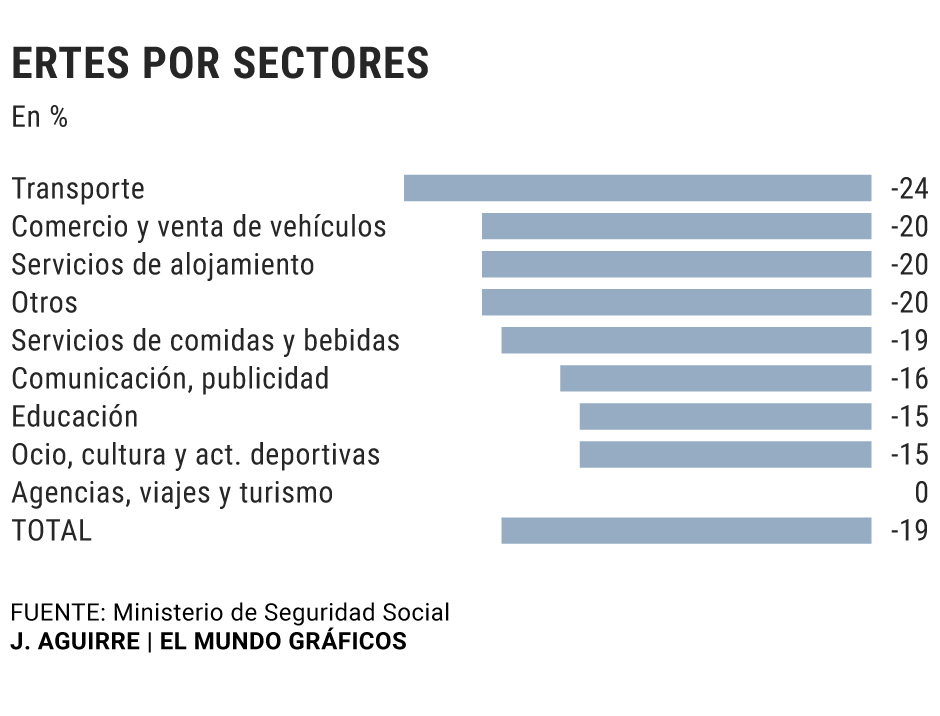The weakness of the tourist campaign and the uncertainty in the face of new outbreaks of coronavirus infections slowed the departure of ERTE workers during the first fortnight of August. In fact, there are already sectors linked to tourism such as travel agencies where in up to 15 regions of the country there is again an increase in those affected by a temporary employment regulation file.
According to data distributed on social networks by the Minister of Inclusion, Social Security and Migrations, José Luis Escrivá, about 880,000 workers remained under an ERTE on August 14. The figure represents a reduction of 20% compared to the end of July, about 239,000 fewer workers. This record represents a third of the 712,000 who left the ERTE in July, although it remains to be seen how the series evolves in the second fortnight.
The statistics show that the labor market began to show symptoms of stagnation again in the second week of the month, while the high rate of ERTE exits in July was maintained in the first. In the first week of August, 160,000 people returned to work, while in the second there were 79,000, that is to say half. In total, 74% of the jobs suspended in April have already left the ERTE.
The question is whether the people who leave the ERTE are going back to work or, on the contrary, end up being added to the unemployment list. Escrivá himself, quite active on social networks during his vacations, has also scrolled graphs in which a strong increase in membership is observed during the first days of August, which multiplies by six the average of the last six years. This is another of the consequences of the economic upheaval caused by the coronavirus, since traditionally this is a bad month for employment as it assumes the end of the summer season.
Most of the economic activities continued to recover their workforces, although at a slower pace. However, in the case of the tourism sector, the improvement has stopped short and only in the case of the Canary Islands - where the economic weight is much greater - are there already reincorporations. In the rest of the country, the ERTE list rises in the case of travel agencies.
The statistics also reflect the reduction in ERTEs by autonomy, and the regions that come out worse in the photo are the Community of Madrid and Catalonia , curiously the two richest in the country. One of the peculiarities of the coronavirus crisis has been its impact on urban Spain and more exposed to the service sector, where the rate of infections has been higher and the confinement tougher.
So far in August, the reduction of those receiving ERTE in Madrid has been 13% and in Catalonia 17%, seven and three points respectively below the national average. In the case of Madrid, the great burden occurs in the hospitality industry and hotels, two of the three areas - along with commerce - that bring together the greatest job losses.
The capital suffered in August the cocktail of the 'empty effect' by the hundreds of thousands of Madrilenians who leave the city for vacations and the reduction in national and international tourists. In the case of bars and restaurants, the decrease in temporary unemployed has been 12% (compared to 19% in Spain) and in hotels 6% (compared to 20% in the country).
In view of the economic slowdown and the early closure of the summer season, the employers Exceltur yesterday demanded an extension of the ERTEs from the Government until spring 2021, warning that the sector will be unable to absorb the hundreds of thousands of employees who currently has received these files by force majeure. Companies and unions agree on their claims since it seems almost impossible that in just a month and a half the number of 773,000 affected by force majeure ERTE can be reduced to zero.
Waiting to see what happens with ERTE, the Minimum Living Income has not just taken off either. This is another of the aid mechanisms put in place by the Government to deal with the pandemic. As of August 7, the National Institute of Social Security had approved 3,966 applications of the 700,000 it had received from families without resources. It represents 0.57% of the total.
The president of the association Víctimas del Unemployment, Joaquín García , told EFE yesterday that the percentage of applications approved "is ridiculous" and slipped that the jam may be due to budgetary reasons: "Lack of money in the box and perhaps also due to personnel problems ».
Minister Escrivá argued last Monday on his Twitter account that “the problem with drawing conclusions so soon is that those that were presented very quickly, which are the most advanced in the processing, seem to have a high percentage of documentation errors, which they must be corrected. '
According to the criteria of The Trust Project
Know more- Catalonia
- Spain
- Madrid
- Social Security
- Jose Luis Escrivá
- Madrid's community
- Canary Islands
- Motor industry
EmploymentCOVID-19: The greatest natural catastrophe leaves the labor market at a minimum pending the Government's economic recovery plan
Health has registered 73 new deaths from coronavirus since Friday, with a notable increase in Aragon
EconomyMadrid is the community that contributes the most to financing the services of other autonomies
See links of interest
- Last News
- Programming
- English translator
- Work calendar
- Daily horoscope
- Santander League Standings
- League schedule
- Movies TV
- 2019 cut notes
- Topics
- Semifinal, live: O. Lyon - Bayern

